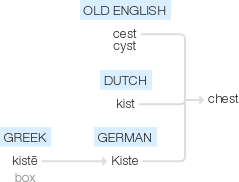Chest
Old English cest, cyst, related to Dutch kist and German Kiste, based on Greek kistē ‘box’.
wiktionary
From Middle English cheste, chiste, from Old English ċest, ċist(“chest, casket; coffin; rush basket; box”), from Proto-West Germanic *kistu(“chest, box”), from Latin cista(“chest, box”), from Ancient Greek κίστη(kístē, “chest, box, basket, hamper”), from Proto-Indo-European *kisteh₂(“woven container”).
Germanic cognates include Scots kist(“chest, box, trunk, coffer”), West Frisian kiste(“box, chest”), Dutch kist(“box, case, chest, coffin”), German Kiste(“box, crate, case, chest”).
From Middle English chest, cheste, cheeste, cheaste, from Old English ċēast, ċēas(“strife, quarrel, quarrelling, contention, murmuring, sedition, scandal; reproof”). Related to Old Frisian kāse(“strife, contention”), Old Saxon caest(“quarrel, dispute”), Old High German kōsa(“speech, story, account”).
etymonline
chest (n.)
Old English cest "box, coffer, casket," usually large and with a hinged lid, from Proto-Germanic *kista (source also of Old Norse and Old High German kista, Old Frisian, Middle Dutch, German kiste, Dutch kist), an early borrowing from Latin cista "chest, box," from Greek kistē "a box, basket," from PIE *kista "woven container" (Beekes compares Middle Irish cess "basket, causeway of wickerwork, bee-hive," Old Welsh cest).
The meaning of the English word was extended to "thorax, trunk of the body from the neck to the diaphragm" c. 1400, replacing breast (n.) in that sense, on the metaphor of the ribs as a "box" for the heart. Meaning "place where public money is kept (common chest, mid-15c.) was extended to "public funds" (1580s). Chest of drawers is from 1670s.
